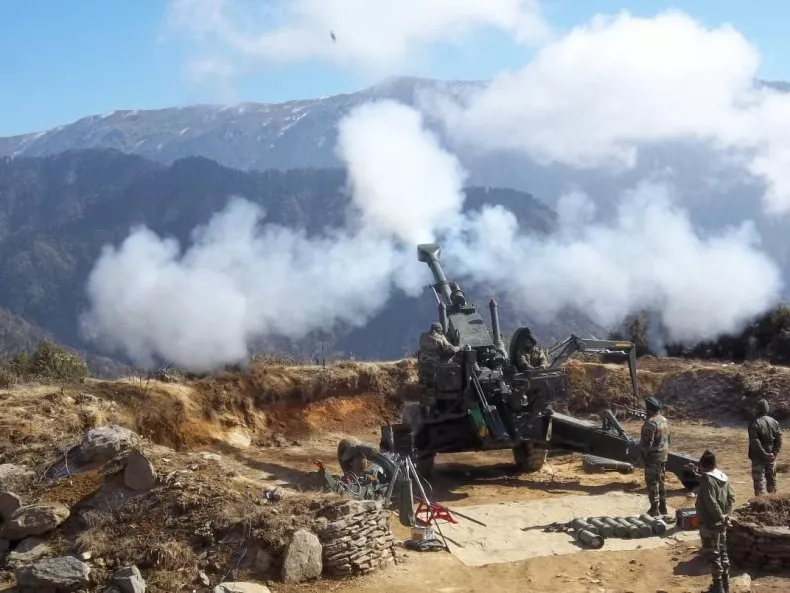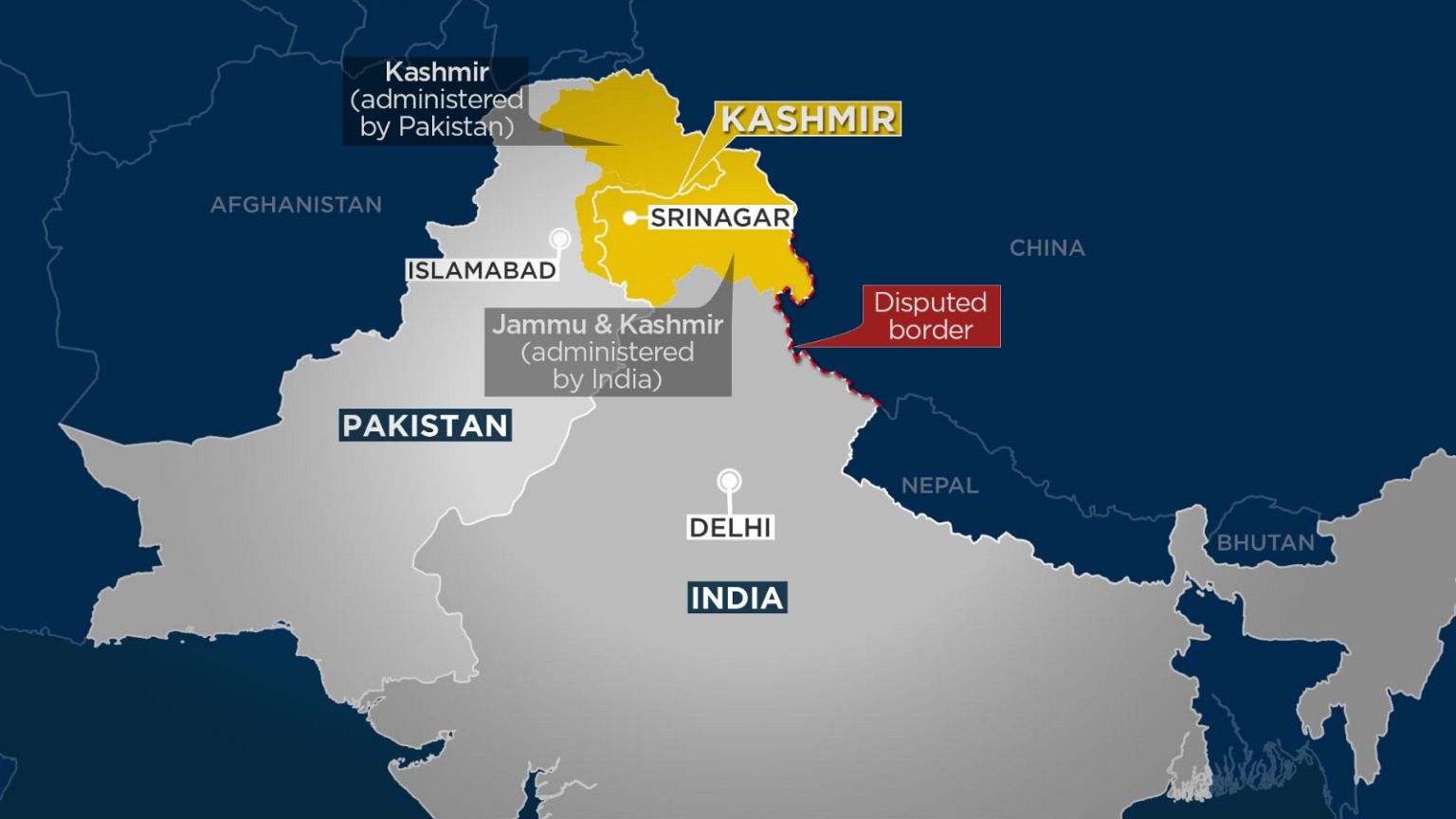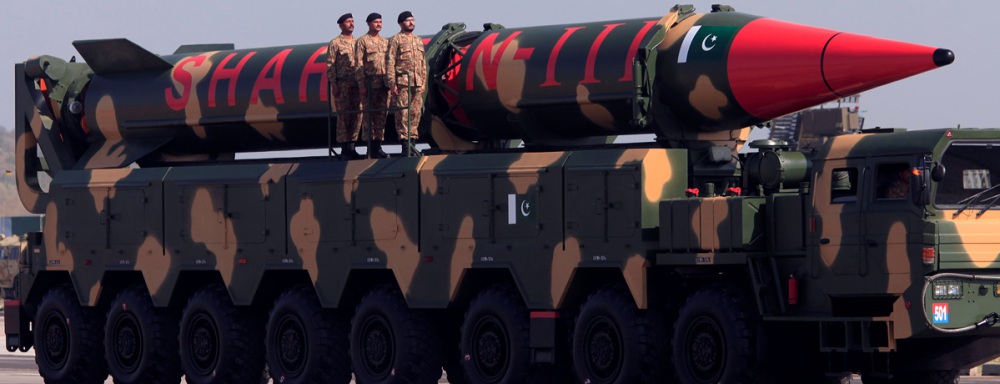125 Million Dead: What Are the Chances of a Nuclear War Between India and Pakistan?

“The possibility of war between India and Pakistan remains low, but a ‘miscalculation or irrational response’ may turn a conventional war into nuclear exchanges.”
After armed groups from the Kashmiri Islamic resistance, which advocates for the independence of Indian-administered Kashmir, killed 27 Hindus in the latest escalation of a prolonged conflict with the Indian army, New Delhi beat the drums of war with Islamabad.
India sealed its borders, suspended the 1960 Indus Waters Treaty — which regulates the shared use of the river that originates within its territory — and threatened to cut off the water supply upon which Pakistan relies for 70 percent of its agricultural needs. Pakistan has branded this move an "act of war."
The Indian National Security Council has claimed it is currently considering military options in response to the militants of the Liberation of Kashmir movement, including the possibility of launching missile strikes and bombings on their bases in Pakistan — a move that could trigger a full-scale war between the two nations, after Islamabad warned of retaliation.
Officially, following a series of escalating hostilities, the ceasefire between India and Pakistan along the Line of Control has collapsed.
Light skirmishes have erupted, with the potential for further escalation, reminiscent of the clashes in 2019, raising fears of a fourth war between the two nuclear-armed rivals.

Why the Escalation Now?
Since India's independence from Britain in 1947, the subcontinent was divided along religious lines, with predominantly Hindu regions joining India and largely Muslim areas becoming part of Pakistan.
Among the most strategically significant regions was Kashmir, a Muslim-majority territory with a Hindu ruler who preferred to align with India.
However, this decision was met with strong opposition from the region's tribes, who favored joining Pakistan, setting the stage for decades of conflict.
In light of this, the first war in Kashmir broke out, ending in 1949 with United Nations intervention.
The region was subsequently divided into two parts: Indian-administered Jammu and Kashmir, and Pakistani-controlled Azad Kashmir (Free Kashmir).
In a bid to solidify India’s control over the region, India’s hardline Hindu Prime Minister Narendra Modi moved to annex Indian-administered Kashmir definitively.
On August 5, 2019, Modi revoked Article 370 of the Indian Constitution, which had granted Jammu and Kashmir special autonomy, in a controversial move that further heightened tensions in the already volatile region.
On December 11, 2023, India’s Supreme Court endorsed Modi's controversial move, officially abolishing Jammu and Kashmir’s semi-autonomous status.
The ruling dismantled the region's flag, criminal code, and constitution, while replacing its elected Muslim government with a Hindu administration.
Modi’s government further sought to alter the region’s demographic makeup by encouraging the settlement of Hindus, effectively displacing the Muslim majority.
The use of bulldozers to demolish homes and mosques became emblematic of a broader strategy aimed at shifting the region’s population dynamics, fueling fears of ethnic and religious erasure.
This was followed by the relocation of thousands of extremists from the ruling Bharatiya Janata Party (BJP) and their families to Kashmir, alongside a controversial policy allowing non-Kashmiri Hindus to purchase property and own land.
These settlers were granted the status of "Kashmiri citizens," with the right to hold public office and vote in elections.
To further escalate tensions, the government enlisted the violent militia of the Rashtriya Swayamsevak Sangh (RSS), a far-right Hindu nationalist organization committed to the ideology of Hindutva—the notion of a Hindu-only nation.
The RSS has been implicated in violent acts against Muslims, including murder, property destruction, and widespread intimidation, in a coordinated effort to forcefully reshape the region’s demographic and political landscape.
The government of New Delhi also seized the offices and lands of all religious and political groups, including the Jamaat-e-Islami, and banned them outright.
Hundreds were arrested under the guise of "counter-terrorism" measures.
A report by Foreign Policy on August 11, 2021, detailed the ethnic cleansing efforts and India's "engineering" of the region's demographic structure.
The report highlighted efforts to erase Kashmir’s Islamic identity by bringing in Hindu settlers, expelling Muslims, and even installing a Hindu prime minister in the region—a strategy aimed at permanently altering the socio-political fabric of Kashmir.
These actions enraged Kashmiri militant groups, which sought to resist the Hindu occupation, a campaign India branded as "terrorism."
The policy further galvanized the resolve of these armed groups, who accused India of colluding with Pakistan in their efforts.
This culminated in a high-profile attack on Hindu pilgrims visiting Kashmir on April 23, 2025, when 27 were killed in what was seen as a direct strike against the ongoing occupation.
Notably, the group claiming responsibility for the recent attack, calling itself Kashmir Resistance, stated that the assault was carried out "in protest against the settlement of more than 85,000 Hindus from outside Kashmir in recent years."
The attack came just a year after a similar incident in June 2024, when Kashmiri militants killed nine Hindus in an ambush on a bus carrying pilgrims. The bus plunged into a narrow valley, resulting in their deaths.

Weapons of War
New Delhi has so far deployed a range of diplomatic and non-diplomatic tools, all under the pretext of responding to the killing of 27 Hindus in Kashmir, some of which have edged dangerously close to the brink of full-scale war between the two countries.
In addition to the exchange of accusations, military threats, and light skirmishes along the border, the most perilous move has been the threat to block the flow of water from the Indus River to Pakistan.
This action, if carried out, could trigger a war over survival, as Pakistan relies heavily on the river for its agriculture and water supply.
Among other hostile measures taken by India, including the closure of the Attari-Wagah border crossing and the cancellation of visa access for Pakistani citizens under the South Asian Association for Regional Cooperation (SAARC agreement), the most alarming step has been the freezing of the Indus Waters Treaty. This move has sparked fears of igniting a fourth war between the two nations.
Indian officials have threatened to block the river's flow if necessary, a drastic action that could plunge Pakistan into severe drought and famine, putting millions of lives at risk.
In response, Pakistan issued a stark warning, "We will not forget it. And we will not leave our Kashmiri brethren in their heroic struggle."
India, in turn, has taken retaliatory steps against Pakistan, including expelling Pakistani military advisors and significantly reducing the size of Pakistan's diplomatic mission in New Delhi.
Indian media has accused Pakistan’s Army Chief, General Asim Munir, of being behind the Kashmir attack, despite Islamabad's official denial of any involvement.
India’s suspension of the Indus Waters Treaty, which has governed the sharing of water from six major rivers in the Indus basin since 1960, would not carry significant weight unless it is followed by the construction of dams to block or control the river’s flow.
Such an action would be a direct challenge to Pakistan’s water security, potentially escalating tensions to a critical point.
While the Indus Waters Treaty is crucial for Pakistan, which relies on the western rivers (Indus, Jhelum, and Chenab) for 70 percent of its water and agricultural needs, the construction of dams to block or divert the river’s flow would amount to a "war plan," as Pakistan has warned.
On April 24, 2025, the Pakistani government declared that any attempt to block or divert water allocated to Pakistan under the treaty would be regarded as "an act of war."
Following a meeting of Pakistan’s National Security Committee, officials stated that the country’s response would involve "complete spectrum of National power," a pointed reference to the possible use of nuclear weapons, according to The Wire on April 24, 2025.

Breach of the Frontline
According to Pakistani reports, Islamabad considers two issues as red lines in its national security: any attempt to cut off its water supply, and any attack on or blockade of the port city of Karachi—both of which India has violated by freezing the Indus Waters Treaty.
A prominent Pakistani analyst clarified that Pakistan reserves the right to launch a first-strike nuclear attack in the event of war, should its conventional forces be overwhelmed.
This is because Pakistan has not signed the Treaty on the Non-Proliferation of Nuclear Weapons' protocols on the first use of nuclear weapons, as reported by The Wire.
In contrast, another prominent Indian analyst argued that if Pakistan were to suspend the Shimla Agreement—a 1972 accord aimed at normalizing relations following the Bangladesh Liberation War—India would be compelled to act swiftly to alter the status quo along the Line of Control (LoC).
This could involve launching strong retaliatory strikes and incursions across the border, actions that Pakistan might also take in response to the suspension of the water treaty. Such moves would effectively breach the threshold of war, bringing the two nations dangerously close to igniting a full-scale conflict.
On April 22, The Economist speculated that the Kashmir attack could spark a new military confrontation between India and Pakistan, both nuclear-armed nations that have fought three wars, including two over Kashmir, since their independence in 1947.
Military analysts and security experts warned, in an interview with The Bridge Chronicle, an American military site, on April 23, of a marked increase in Pakistani Air Force activity near the Line of Control in Jammu and Kashmir, signaling rising tensions along the volatile border.
The Shimla Agreement, signed between India and Pakistan on July 2, 1972, was a peace treaty aimed at resolving border disputes and fostering better relations between the two nations. The agreement outlined key principles for the peaceful settlement of conflicts and set the framework for bilateral cooperation.
The treaty was crafted in the aftermath of the Indo-Pakistani war in December 1971, which resulted in the secession of East Pakistan and the creation of the new nation of Bangladesh.
On April 24, 2025, the Indian government officially notified Pakistan of its decision to suspend the Indus Waters Treaty "with immediate effect," a move that represented a direct violation of Pakistan's red lines on national security.
In response, the office of Pakistan's Prime Minister issued a statement reaffirming that the National Security Council, the country’s highest decision-making body, "strongly rejects" India's announcement to suspend the treaty.
The treaty, it asserted, was a “binding international agreement brokered by the World Bank and contains no provision for unilateral suspension.”
"Any attempt to stop or divert the flow of water belonging to Pakistan as per the Indus Waters Treaty, and the usurpation of the rights of lower riparian will be considered as an Act of War and responded with full force across the complete spectrum of National Power."
The reference to the "complete spectrum of National power" was widely interpreted as a veiled allusion to Pakistan's nuclear arsenal.
Analysts warn that suspending the Indus Waters Treaty could spell a potential disaster for Pakistan’s agriculture, particularly in the Punjab and Sindh regions, where millions of farmers rely on the flow of the western rivers to secure essential irrigation for their crops.

Suspension of the Simla Agreement
In response to India’s breach of the war threshold by freezing the Indus Waters Treaty, Pakistan's government announced on April 24 that it was suspending the Shimla Agreement, which had been pivotal in normalizing relations and establishing understandings following the 1971 war. This move effectively signaled a return to the brink of war.
The Shimla Agreement, signed on July 2, 1972, in the Indian city of Shimla, Himachal Pradesh, by Indian Prime Minister Indira Gandhi and Pakistani President Zulfikar Ali Bhutto, was a direct consequence of the Indo-Pakistani war.
At the time, the Shimla Agreement represented a significant diplomatic achievement, normalizing relations and fostering stability in the Indian subcontinent after the conflict.
In the official text, the parties affirmed their willingness to "put an end to the conflict and opposition that have hitherto marked relations" and to "work for the promotion of a friendly and harmonious relationship and for the establishment of lasting peace in the subcontinent".
They also agreed to transform the 1971 ceasefire line into the Line of Control, which today serves as the de facto border between the Indian- and Pakistani-controlled regions of Kashmir, with both parties agreeing not to alter it unilaterally.
Therefore, Pakistan's suspension of the Shimla Agreement is seen as a de facto declaration of war and a rejection of the current Line of Control.
This move opens the door for potential violations of the border by both countries' forces, potentially reigniting the three previous wars and escalating to a fourth, particularly after India's decision to freeze the Indus Waters Treaty, effectively choking Pakistan’s water supply.
While some Indian analysts have argued that Pakistan's decision could further undermine any prospects for dialogue and de-escalation, the situation remains dangerously volatile.
"The suspension could signal a strategic shift by Islamabad, which could now seek the intervention of third parties, such as the United Nations, China or the Organisation of Islamic Cooperation (OIC), to relaunch the Kashmir dossier on the international stage," according to Agenzia Nova on April 24, 2025.
India, in turn, stated that Pakistan's move effectively renders the border open. In response, Pakistan's Defence Minister, Khawaja Asif, issued a stern warning: should India violate Pakistan's sovereignty, the country would retaliate with a response that would be both strong and fitting.
"We have reinforced our forces because it is something which is imminent now. So in that situation some strategic decisions have to be taken, so those decisions have been taken," Defence Minister Khawaja Muhammad Asif told Reuters in an interview at his office in Islamabad.
Pakistan was on high alert but would only use its nuclear weapons if "there is a direct threat to our existence," said Asif.
Pakistan's Foreign Minister, Muhammad Ishaq Dar, issued a stark warning in an interview with Hum News that his country is a nuclear state with a sophisticated missile arsenal.
He cautioned India to recognize this fact and refrain from any violations of Pakistan's sovereignty and security.

Nuclear War
The escalating tensions have alarmed both Western and Indian-Pakistani media, with reports expressing concerns that an "irrational response" could trigger a nuclear war between India and Pakistan, according to The Times of India on April 24, 2025.
The newspaper cited declassified U.S. intelligence reports, which were released amid the ongoing Kashmir crisis, noting that while “The possibility of war between India and Pakistan remains low, but a ‘miscalculation or irrational response’ may turn a conventional war into nuclear exchanges.”
According to The Times of India, "The release refers to a 1981 U.S. intelligence estimate titled ‘India’s Reaction to Nuclear Developments in Pakistan,’ which evaluated the possibility of an Indian attack on Pakistan’s nuclear facilities should developments in that country threaten India’s security."
"Indian strategists viewed a preventive attack as dangerous because a Pakistani counterattack on India’s nuclear installations could cause similar harm."
A study published in 2019 by Science Advances estimates that such a conflict could kill between 50 to 125 million people within a week, surpassing the total death toll of World War II.
"Pakistan and India may have 400 to 500 nuclear weapons by 2025 with yields from tested 12- to 45-kt values to a few hundred kilotons. If India uses 100 strategic weapons to attack urban centres and Pakistan uses 150, fatalities could reach 50 to 125 million people, and nuclear-ignited fires could release 16 to 36 Tg of black carbon in smoke, depending on yield," the study states.
A study published in Nature Food in 2022 projects that such a war could lead to a significant decrease in global food production, with maize and wheat yields dropping by up to 40% in key regions.
"These reductions in crop yields would not be confined to the immediate vicinity of the conflict but would have global repercussions, potentially leading to widespread food shortages and famine."
"The study emphasises that the impacts on agriculture would be severe, affecting food security worldwide."
Sources
- India and Pakistan could come to blows over Kashmir
- Blocking Indus Waters Treaty Would Be Considered Act of War: Pakistan Retaliates to India’s Decisions After Pahalgam’
- Irrational response’ may trigger India-Pak nuke war: Pak nuke war: Declassified US reports
- The global stakes of an India-Pakistan nuclear war
- Here’s why a flare-up between India and Pakistan over Kashmir matters
- Pakistan: What Does the Suspension of the Shimla Agreement Mean After India's Actions? [Arabic]
- Exclusive: Pakistan defence minister says military incursion by India is imminent








